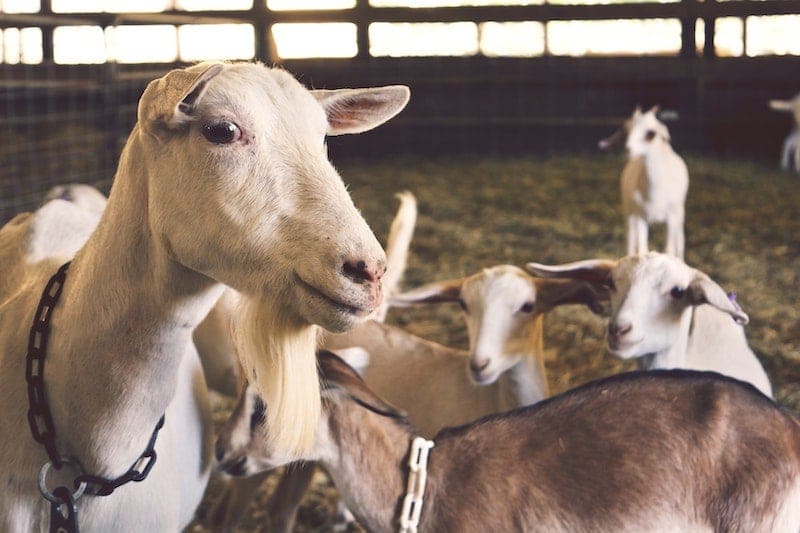The Many Benefits of Goat Milk
Much has been written about the relative benefits of goat's milk versus cow's milk. The fact is, both are highly nutritious and both have their pros and cons. However, it is interesting to note the significant positive data published on the benefits of goat milk.
Cow's milk may not be right for all of us. In such cases, an alternative is generally sought that mitigates the possible adverse effects on the body. The nutritional value of goat's milk is close to that of cows, but with certain special properties that have potential implications for health and, more specifically, digestion. In most cases, switching from cow's milk to goat's milk can be done easily and anecdotal evidence suggests that switching to goat's milk alleviates problems such as eczema; asthma; bloating and constipation, among others.
Over the course of upcoming blogs, we'll introduce possible reasons why you might consider goat's milk as an alternative.
Over the course of upcoming blogs, we'll introduce possible reasons why you might consider goat's milk as an alternative.
1. Less alpha-S1-casein
Cow's milk intolerance is believed to be related to proteins 6 contains, in particular alpha-S1-casein 7. Goat's milk has a significantly lower percentage of alpha-S1-casein than most cow's milk and this is what makes it more tolerable for some people. However, goat's milk contains an overall high level of protein, providing almost 6g per 200ml serving. 1
However, goat's milk is not recommended for anyone who has been diagnosed as allergic to cow's milk. Some proteins in goat's milk are sufficiently similar to those in cow's milk that they can cause cross-reactivity. Specialized advice should be taken.
2 . Low in lactose
Goat milk is not recommended for anyone who has been diagnosed with lactose intolerance. However, goat's milk generally contains slightly less lactose (the natural sugar found in milk and other dairy products) than cow's milk, 8 and the amount of lactose that people can tolerate varies. 9,10 This may help explain why some people who experience lactose sensitivity can enjoy goat milk without any repercussions. However, expert advice should be sought before making drastic changes to your diet.
3 . Different proteins and fats.
While the fat content of goat's milk is similar to cow's milk (3.6% for all, 1.6% for semi-skimmed, and only 0.1% for skimmed), the fat globules are naturally much smaller in size 2. The protein composition of goat's milk also allows it to form a smoother curd during digestion, which can help with your digestive health and comfort.
To be continue………
References
1 Tomotake H et al (2006). Comparison between Holstein cow's milk and Japanese-Saanen goat's milk in fatty acid composition, lipid digestibility, and protein profile. Biosci Biotechnol Biochem 70: 2771-2774
2 Attaie R and Richter RL (2000). Fat globule size distribution in goat's milk. J Dairy Sci 83: 940-944
3. Ensign MJ and others (2001). Digestive use of goat fat and cow's milk in malabsorption syndrome. J Dairy Res 68: 451-61
4. Almaas H and others (2006). In vitro digestion of bovine and goat milk by human gastric and duodenal enzymes. Int Dairy J 16: 961-968
5. Tripaldi C et al. (1998). Taurine content and other free amino acids in the milk of goats raised in Italy. Small Rumin Res 30: 127-36
6. El- Agamy El (2007). The Cow's Milk Protein Allergy Challenge. Small rum res: 6864-72
7. Restani P and others (1999). Cross reactivity between milk proteins of different animal species. Clin Exp Allergy, 29: 997-1004
8 McCance and Widdowson's Food Composition. Seventh edition. Royal Society of Chemistry. Ministry of Agriculture, Fisheries and Food.
9. McBean LD, Miller GD. (1998) Dispelling Fears and Fallacies About Lactose Intolerance. J Am Diet Assoc; Vol. 98: Issue 6, P671-76
10 Pribila BA and others (2000). Improves lactose digestion and intolerance among African American teenagers fed a dairy-rich diet. J Am Diet Assoc 100: 524-28


